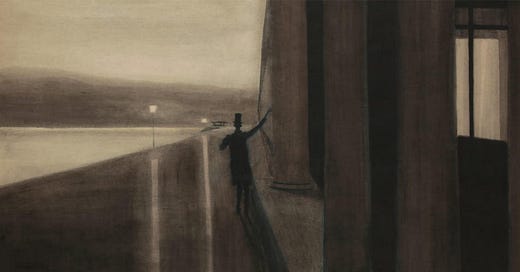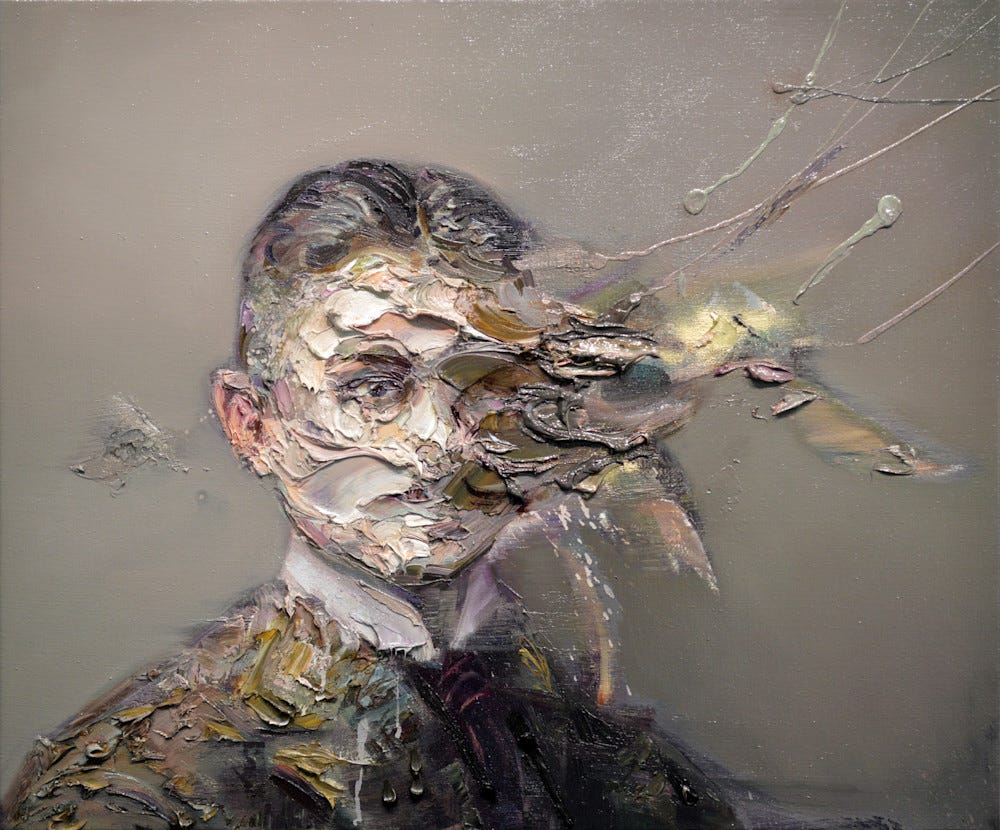What happens here, the most pernicious development in all of this, is that rational coherence itself actually becomes a source of cognitive dissonance. As paradoxical as that may sound.
It’s a bit of a mess right now, innit?
I was going to write a piece on what I’ve tried to define as “the myth of society”. By this I mean something like the manufactured substitute of a sense of belonging and of a cohesive common purpose whose original form is probably the natural state of a healthy-small scale society. You know, like the bands or villages of 100-200 people that human beings evolved to take part in.
So the point is that this natural set of attachments to friends and relatives that is readily visible in tribal and nomadic contexts (and sometimes there’s even a shadow of these in our own private relationships today) gets usurped and transposed into equivalent attachments to Society — as an idea one step removed from immediate relational realities.
At least something like this used to be the case.
The idea was to make a few points on such a social institution, this synthetic experience of belonging and solidarity, the constructed perception that these are “our” schools, “our” police and “our” politicians, and how the substitution of a normal sense of belonging in our immediate context for this “myth of society” is predicated on trauma. That real relationality must be suppressed and dislodged so that we can be inscribed with the artificial substitute that facilitates our attachments to authority and the power structure.
But even so, the synthetic experience is the next-best thing, and vastly preferable to the vertigo of a fractured existence where there’s not even this substitute for a tribal embeddedness. The substitute at least allows for a basic existential stability. It’s something to build on, something to rebel against, and it can even provide a foundation of meaning if you can integrate into the foundational myths of the society.
All of this is related to both the alienation and reification processes of capitalism, as well as to the deeper psychic (mal)formations that Freud and the primitivists connect to complex societies with any kind of division of labor, social stratification and destruction of the natural environment. But as many of you have pointed out during the last few years, it seems like this very mode of being, this constructed perception of belonging, was transformed and taken to another level through what transpired in relation to the covid event.
And while I was going to try to make a few cursory points around such manufactured cohesion, it now looks to me as though we’re not really seeing stable structures of attachments of this kind any longer.
My initial hypothesis was something along the lines that the legacy “myth of society”, which originally meant these synthetic attachments to a domain in which the citizen was enveloped, and its physically present institutions, powers, symbols, rituals and patterns has now simply started a transformation towards a kind of extended and malleable hyper-state.
The emphasis here was that where this manufactured sense of belonging and purpose used to connect with tangible and visible institutions like the state, the nation, a political party (also the neighbourhood, the physical surroundings where you grew up, the embedding culture and the language, and the expected trajectory of a human life in your society), or even the entirety of the West and its foundational myths — the focus gradually shifted towards something else.
The attachments to all of these half-tangible things in your lived experience gradually got transmuted into attachments to identities, brands and consumer culture. Of course, this is nothing new — the process began about a century ago with the development of a genuine mass culture and was clearly evident with the coming-of-age of the boomer generation. The rise of the subculture as an often subversive mode tracks its development closely.
But (and this was the core of my hypothesis) the next step in all of this was a situation in which these attachments, this synthetic (yet no less existentially crucial) mode of belonging and purpose, had been progressively transposed into something quite different and much more malleable than the semi-stable consumer identities, brands and subcultures which had their apex maybe 40 years ago.
What I think we’re moving into, and which has been amply exemplified by the cultic dynamics around all of the major mediatic focal points of the last six years, is a political context where the manufactured experience of belonging has become almost entirely detached from any specific parameters of meaning.
A lot to take apart here.
What I mean by this is that this primal need of the human being as discussed above, from having been sublimated and projected onto fetishes of the state, the commodity, or of the consumer identity, has now been disconnected from narratives, symbols or frameworks of meaning to such an extent that whatever remains of these attachments can increasingly be freely projected upon (or juxtaposed to) whatever the power structure and the propaganda system happens to favor at the moment.
We can see a clear consequence of this in how ideologies and meta-narratives have more or less been emptied of meaning, reduced to projection surfaces for almost anything you choose, with little more than hollow shells of their likenesses floating about in the popular discourse. This is how “leftism” could without contradiction include support for NATO as expressed by “Breadtube’s” idiotic awe over memes of rainbow-painted Sherman tanks fighting Russia. It’s how feminism becomes wedded to a transhumanist utopianism that discursively eliminates the female sex — and it’s conversely also why the radical right, as a comparatively coherent, stable, and ontologically realist worldview, presents such an attractive alternative in the eyes of an increasing number of especially younger men.
The “woke” phenomenon and pseudo-movement is a clear example of the non-ideology that results from the detachment of belonging and purpose from any kind of stable narrative framework. “Woke” lacks any kind of formal principles and theoretical anchoring, it supports whatever cause that can be meaningfully communicated as morally upright on a watered-down consumerist liberalism, and is therefore maximally malleable from the perspective of the power structure.
Our contemporary political culture of “supporting the current thing”, fostered by our implicit social credit system of social media virtue signalling, is the inevitable result.
Deliberative political participation completely and finally reduced to spectator sports, yet with even the team identities removed.
And the obvious path towards this kind political and cultural situation where reason is substituted for pure power, and where the existential grounds of belonging are externalized so as to be constituted by the irrational fiat of propaganda and political signalling, goes through trauma.
The mechanics of this are very complex and worth discussing at great length, but we can just observe that trauma is something that this generation has been uniquely exposed to, not only due to the character of the events of recent years, but because we’ve been more uprooted than anyone else in history. We’re not just alienated from the fruits of our labour — we have almost no control of the necessitites for our own survival and are fully if implicitly aware that faceless powers beholden to nothing and nobody determine whether we live or die. We’re under constant and intimate surveillance and have been alienated from family, culture, religion, normal relationships and nature.
We have even been disconnected from our very own selves through the pernicious effects of a constant digital spectatorship where our fake avatars usurp our own subjective presence, which in turn is implicitly challenged by the reductive ideologies of secularism, scientism, and the AI hype and its narratives of synthetic agency.
This nakedness, this profound vulnerability that we have been forced into, that has been foisted upon us as human beings, will then act as a force multiplier for existential and psychic trauma. In other words, we become incredibly sensitive to disruptions of meaning when our framework of belonging, identity and psychic integrity is just a thin and unstable veneer on top of a black abyss.
And in this hyper-exposed state devoid of any natural robustness and normal structures for adaptation and coping, this means that we will tend to cling to whatever substitute is offered to us. Any port in a storm.
So what substitute for meaning and belonging is offered to us? What stands in place of even the synthetic “myth of society” and the existential stability it used to provide in relation to institutions, fundamental narratives or even an comparatively enduring commodity fetishism and subcultural shelters of a fractured postmodern condition?
What remains is really little more than authority.
There’s just no myth of society left.
The unprecedented isolation, the traumatic fears, the alienating conditioning, and the enforced attachments to digital consumption seem rather to have fractured the collective psyche around matters of meaning instead of effectively usurping this “myth of society” and channeling our attachments and sense of belonging towards new or more specific ends.
This means that we implicitly must rely on nothing but the irrational fiat of the propaganda machinery and the paradoxical consensus of the digital media apparatus.
For so many people, there’s namely nothing else. Nothing else at all.
And it’s not that we consciously make a decision to anchor our sense of meaning and belonging in an attachment to authority filtered through propaganda. Since we have nowhere else to turn, this anchoring will be implicit and tacit, and will for the most part only emerge in a significant cognitive dissonance when we deign to question and potentially destabilize the thin veneer of existential security that this cryptic and fickle power bestows.
'How many fingers, Winston?'
'Four. I suppose there are four. I would see five if I could. I am trying to see five.'
'Which do you wish: to persuade me that you see five, or really to see them?'
'Really to see them.'
'Again,' said O'Brien.
Perhaps the needle was eighty--ninety. Winston could not intermittently remember why the pain was happening. Behind his screwed-up eyelids a forest of fingers seemed to be moving in a sort of dance, weaving in and out, disappearing behind one another and reappearing again. He was trying to count them, he could not remember why. He knew only that it was impossible to count them, and that this was somehow due to the mysterious identity between five and four. The pain died down again. When he opened his eyes it was to find that he was still seeing the same thing. Innumerable fingers, like moving trees, were still streaming past in either direction, crossing and recrossing. He shut his eyes again.
'How many fingers am I holding up, Winston?'
'I don't know. I don't know. You will kill me if you do that again. Four, five, six — in all honesty I don't know.'
(1984).
What happens here, the most pernicious development in all of this, is that rational coherence actually becomes a source of cognitive dissonance. As paradoxical as that may sound.
This is a most remarkable phenomenon that I don’t think Orwell, or anyone else within the 20th century dystopian tradition, actually gets into in greater detail. Huxley, as well as critics of mass culture and mass communications media like Postman, McLuhan and Mander rightly observe that the mode of entertainment and trivial content will crowd out the space for analysis, exposition and critical reflection.
And Guy Debord of course gives an in-depth autopsy of the cognitive economy of this spectacular mode of technological capitalism and how it radically undermines authenticity through a situation where the production of propaganda becomes an end in itself, perversely disconnected from any other objectives apart from its own proliferation.
But nobody seems to home in on the maddening possibility that we would find ourselves in a situation where rational coherence as such would be a source of cognitive dissonance. Where Winston’s desire to see the five fingers becomes so deeply rooted in his conscious experience that truth as such, with its implicit potential to contradict the fiat of power, becomes a source of discomfort or even anguish.
But it makes perfect sense that we, in a situation where authority becomes the exclusive warrant for existential security, may come to sit uneasily with any form of complex rational coherence that stands on its own legs.
It’s not just that Debord, McLuhan and Ellul were right — that kids today no longer expect things to make sense anymore because nothing communicated to them really does.
It’s that they genuinely don’t want it to make sense anymore because rational coherence as such is disincentivized. If you believe your own lying eyes and communicated this in the digital frameworks for surveillance and social credit, you risk being ostracized. Even if what you say at the moment is compatible with the prevailing narratives (we’ve always been at war with Eastasia), you may be asked to explain yourself when the winds inevitably change.
In other words, when power is the only thing that really makes much sense, people will come to recoil from a complex rational coherence that inevitably will stand in contradiction to the simplistic and ultimately irrational dictates of power. The rational itself will soon become an object of fear, hatred, and even horror.
This is the Lovecraftian mode of politics.
A discourse which implicitly carries an affirmation of reality itself as weird and uncanny, all the way down, and which reproduces a pernicious attachment to a fundamentally irrational form of authority as the thin veil between ourselves and the gaping abyss.
Who knows the end? What has risen may sink, and what has sunk may rise.
Loathsomeness waits and dreams in the deep, and decay spreads over the tottering cities of men.
“The Call of Cthulhu”.







I've been thinking along almost exactly these same lines the last few months. From other angles, obviously, but the core issue is the same. One insight came to me, oddly, from professional sports. (being american I was following the NBA). And sports , team sports, football or baseball (US again) or basketball are now huge HUGE economic entities, but the original appeal of sports was utterly tribal. Teams wear certain colors, certain uniforms, and very far back represented geographic regions. That soon disappeared and players were 'hired' from all over. This weakened the tribal attachment but so deep is the need for this that it didnt matter. But surprisingly the corporations and billionaires who run big time sports seem not to realize the reason their fans watch these events. And so they further erode the appeal to the point now where agents and shoe companies have their players change teams every year. And the attachment to teams is ever weaker. And i see how there is now less and less enthusiasm for these big pro league sports. This is like the allegory of society in microcosm, actually. The other aspect is (given Im a freudian) that (in short form) whatever the Oedipal narrative is exactly, its no longer existent in a patriarchy (of a hundred years ago) and nobody works through this narrative, and hence you see a society (sic) of children stuck in various stages of underdevelopment. (Philip Rieff wrote about this, and i covered his stuff here( https://john-steppling.com/2024/11/the-tortured-present/ ) . This illusion of a 'society' is increasingly threadbare. Coupled to (and this seems a logical progression) eroded education, where even basic cognitive skills are no longer taught (i just wrote about the loss of a book culture) and people literally cannot cursively write their own names anymore. Intersecting with all this is technology ( https://www.artsy.net/article/artsy-editorial-ai-art-winning-young-collectors?utm_source=braze&utm_medium=email&utm_campaign=editorial-roundup&utm_term=Sunday-Editorial-04-06-25&utm_content=yes-affinity ). And bolson had an interesting rant suggesting he listens to the podcast (https://youtu.be/AmFUcajDZCU?si=XxGTjyJlqW6cAYJq ). The facsimile society we live in has indeed lost all connection to meaningfull experience -- i dont think one can escape childhood here -- children enter schools that are designed to fragment identity and diffuse tribal instincts. One aspect is probably progressive, but the more significant sets the groundwork for this loss of purpose and/or meaningful signposts for life. And i think the result (along with alll other things noted) is the infantilism we see.
"It’s not just that Debord, McLuhan and Ellul were right — that kids today no longer expect things to make sense anymore because nothing communicated to them really does."
This didn't just happen now. I recall growing up being upset at things happening in the world in the 80s. The explanations that I got were illogical, whether it be politics, economics, or religion. School didn't help either as they too had this history that felt devoid of honesty. That's why they're still able to stir the pot about the JFK assassination.
It was never logical and it always depended on the us vs them war like mentality in order to justify little and big atrocities.
We are and we were insane for a long time. After all, Orwell wrote 1984 about his time.
Iain McGilchrist sees it as a result of being left hemisphere biased.
https://robc137.substack.com/p/left-brain-vs-whole-brain-in-battlestar